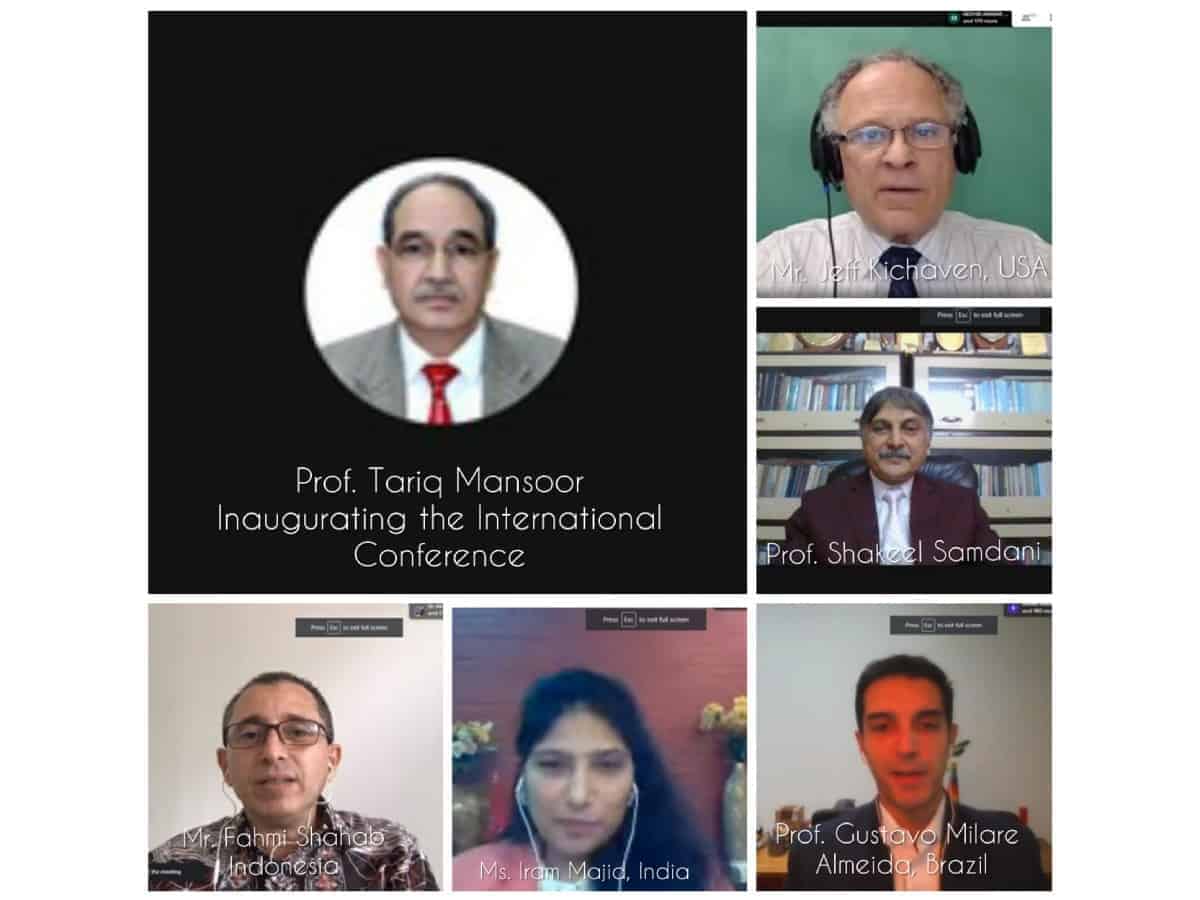Aligarh: The Law Society, Faculty of Law, Aligarh Muslim University (AMU) in collaboration with the Indian Institute of Arbitration and Mediation Center, New Delhi organised the first International Virtual Conference in the University on ‘Globalization of Justice Through Alternative Dispute Resolution- ADR’ in which experts delineated how national and international legislators and organisations are increasingly offering citizens with the opportunity to resolve disputes outside courts.
Inaugurating the virtual conference, AMU Vice Chancellor Prof Tariq Mansoor pointed out that ADR is based on Gandhian principles as Mahatma Gandhi encouraged solving disputes without litigation.
Speaking on the wide spectrum of ADR, Prof Mansoor said that mediation through the ADR process can be understood as a process where an impartial third-party is appointed to facilitate structured negotiation between disputing parties to help them reach a mutually agreeable settlement.
He gave the example of the Ayodhya dispute and pointed out that the Supreme Court appointed mediators to settle it.
“In Indian context, the Lok Adalat plays a very important role in resolving disputes at village level,” said the Vice Chancellor.
“The ADR process delivers justice in an amicable manner through special communication, negotiation and social skills to assist the disputants in arriving at a mutually acceptable solution themselves,” said Prof M Shakeel Ahmad Samdani, Dean, Faculty of Law, while presiding over the conference.
Discussing ADR objectives, Prof Samdani emphasised that this process is not to evaluate guilt or innocence but to promote understanding, making the disputed parties focus on their interests and encouraging them to reach their agreements.
He further said that solving the disputes through ADR is also advised in the Holy Quran. He stated verse number 35 from Surah An-Nisa which says that “And if you fear dissension between the two, send an arbitrator from his people and an arbitrator from her people. If they both desire reconciliation, Allah will cause it between them. Indeed, Allah is ever Knowing and Acquainted [with all things].” Prof. Samdani also gave the example of ‘Darul Qaza’ in India. Darul Qaza helps in solving family disputes within a very short duration of time and it is almost free of cost.
Mr Jeff Kichaven, Mediator, Los Angeles, USA thanked the Dean, Faculty of Law, Prof. Shakeel Samdani and Iram Majid, Director, IIAM for inviting him to attend this conference.
Mr. Jeff delineated the globally followed mechanism of mediation and how it saves time.
“There is no formal procedure, no cross examination, no biases and the parties are free to negotiate on their terms and conditions,” said Mr Kichaven.
He further said that “doing arbitration and mediation is becoming the global profession. He also spoke on how mediation is totally different from the traditional justice system and the increase in online mediation after the COVID-19 outbreak.
Mr Fahmi Shahab, Director, PMN Mediation Centre, Indonesia discussed the powers and duties of a mediator.
He said that it is the duty of the mediator to educate the parties about the issues and help them in reaching a solution and also to make sure that the disputed parties do not breach the outcome of the mediation. He also highlighted several disadvantages of the process when the mediator is less representative and unprepared. While concluding his address, Mr Shahab said that he feels very happy to deliver a lecture in Aligarh Muslim University.
Arbitrator, mediator and Brazil based attorney, Prof Gustavo Milare Almeida said that the relevance of ADR is increasing in various parts of Brazil. He said that the mechanism of ADR constitutes 1.4% of Brazilian GDP.
“Family and commercial disputes in Brazil are being solved through mediations and the Government is putting efforts to develop an efficient ADR mechanism,” added Prof Almeida. He also emphasised on the various aspects of ADR in Brazil. He concluded by saying that ADR is a very important tool of globalization.
Ms Iram Majid, Director, Indian Institute of Arbitration and Mediation spoke on how justice is achieved globally through ADR.
“With no jurisdictional limits in ADR, parties can choose laws of their own choice,” she said adding that peace building can be done through dialogue, mediation and reconciliation. She also gave examples of the Peru and Ecuador dispute.
Ms Iram also discussed how mediation and arbitration is becoming the new normal to deliver justice during the Covid 19 Pandemic.
Prof Zaheeruddin extended the vote of thanks and Prof Wasim Ali delivered the welcome address. Mr Mohammad Nasir moderated the question and answer session.
Abdullah Samdani, Secretary, Law Society conducted the conference, while Ayesha Nasir Alawi, Joint Editor, Law Society gave a brief introduction of the guests.
Shoeb Ali, Fozia, Shelja Singh, Habiba Sheikh and Akahsh Ranjan Goswami were the rapporteurs of this international conference. This conference was made a great success with the tireless efforts of Shubham Kumar, Pawan Varshney, Hunain Khalid, Kashif Sultan, Samra Hashmi, Somya Goyal, Ayesha Samdani, Anjum Tasneem, Habiba Sheikh, Yash Agarwal, Chandan Sharma, Mohd Sabeeh, Afif Khan, Kaif Siddiqui, Abhay Jaudan, Turshar, Talat Anjum, Moiz and Tabish Kamran.

